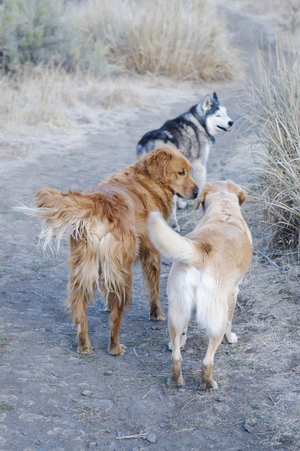 Social dog
Social dog
We all want our dogs to
play nice with other dogs—and shouldn’t it come naturally? Dogs are social,
after all. So why does an otherwise sweet-natured canine buddy turn into a
killjoy at the park? Well, dogs can be introverts, too. Like humans, they can
have bad days and they occasionally form instant dislikes to new dogs. But
where we get to choose our friends and are free to avoid anyone we can’t stand,
dogs pretty much have to go wherever we take them. What’s more, they are
territorial creatures, protective of their favorite things, their home turf,
and us. Adding another dog to the equation, familiar or not, always holds the
potential for fireworks.
Why are some dogs more
social than others? Genetics and breed play a role, and so does early
socialization. Here, too, the human analogy is apt. Some of us come out of the
womb gregarious, others are born shy and unsure of how to negotiate the
dynamics of social groups. We also are greatly affected by our earliest experiences.
An otherwise confident and social child finding herself the target of bullies
on the playground could be forever changed as a result. Similarly, dogs are the
sum of their parts: DNA and experiences thrown into a pot. Some herding or
hunting breeds, for example, were bred for the ability to work independently
and might find playtime at the park a monumental waste of time.
If a dog’s anti-social tendencies go beyond
polite disinterest, adult socialization is an option. Working through a program
to build positive associations to other dogs using rewards and comfortable
distances can greatly improve relations between a dog and her peers. But if a
dog is civil to most dogs, but doesn’t play or gets grumpy when approached by
bouncy youngsters, a bit of situational awareness might be all that’s needed:
favoring open spaces and less-busy trails for walks, crossing the street if
there isn’t room to circumnavigate another dog on a sidewalk, etc. After all,
why shouldn’t dogs be allowed to be who they really are?

